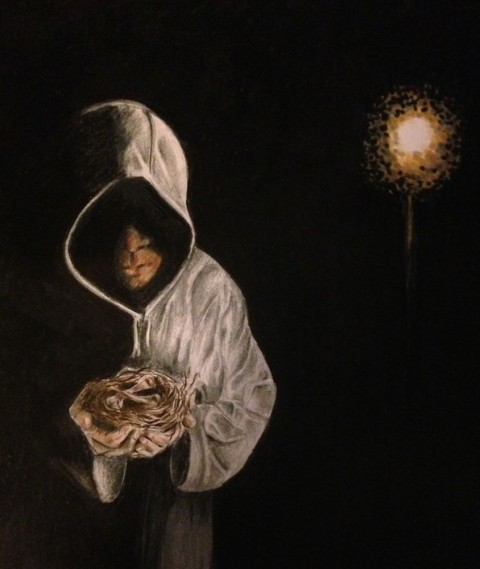The horrors waited outside patiently. Even policemen, the horrors thought. We get even policemen, in the end.
Donald Barthelme, “The Policeman’s Ball”
This year my wife Vivian and I have suffered a hard run of violence. In spring, her parrot, Nickels, hung herself on some twine that blew into the cage from an air vent. Our cat, Stravinsky, who loved the parrot, grew heartsick and sauntered from underneath Nickels’ empty cage, out the front door and into traffic. A poor sparrow, afraid of the cat, cracked its beak on our bay window, stumbled two steps, and died feet-up. The sparrow left behind a nest and three eggs in the eave of our front porch, which my wife found the next morning windswept across our driveway, eggs no longer intact. My wife, a radiant soul, buried the sparrow and her eggs next to Nickels and Stravinsky in the front garden. She mourned each death and comforted me through my own grief. It was one of those things where death begets death, at least that’s what we discussed over our pimento loaf lunches.
Summer, shortly after our neighbor, Horace, was found strangled to death in his bed, a naked woman moved into his front yard and began to starve herself next to a hand-painted sign that read “stop the violence.” We watched as she publicly withered and moaned through pangs in the night, as her hair fell out and eyes sunk in, as her bug bites swelled and skin peeled. We prayed for rain and then prayed for sun. We implored her from our driveway to join us for a meal. Neighbors and passersby left granola bars and fruits and crackers, anything they had in their cars, but the food was left to fester on the side of the road. One evening during the hunger strike, Vivian came home distraught, her blouse torn away from her chest. She told me an angry employee attacked her in the parking lot after she gave him his annual review, and she refused to tell me his name. That night, I woke to an empty bed and found Vivian holding the emaciated woman in our neighbor’s front yard, nursing her sores and thanking her.
It was around that time Vivian and I grappled for each other late into the nights, when the crickets rang over the woman’s cries, and the accumulation of horrors hung in our stomachs like a foul humidity. She woke me every night for a week, body wound and furious, hands grabbing for my neck, her wine-flavored breath coating the back of my throat. We were scared, and we coiled around each other until we fell away from everything.
Fall, the leaves fell late, and there was the matter of the ladybug infestation that made its way from our basement to the kitchen. We were both sensitive to the prospect of killing anything ourselves, and I shook as I strapped on the gas mask and peeled the ladybugs from the surfaces of our kitchen with a jet of chemicals, their bodies a wash of clicks as I dumped them in the trash.
We had a few quiet weeks where our dread swelled and we rarely spoke. Vivian had difficulty eating and stayed awake at night, biting her nails to infomercials. I slept before sundown and woke late. When the house was quiet, we could hear a faint chorus of laughter from the woods out back. Then one morning, Vivian threw up. She was pregnant.
Prostate cancer struck Vivian’s father the week before the hunger striker was rushed to the hospital. The laughter outside deepened. Someone began piling fleshy animal bones on our front porch at night. Stray cats and raccoons fought each other over the bone pile.
Vivian’s father was fifty-five, and he wasted away, much like the hunger striker, into the early weeks of winter. Two days before his death, I sat with Vivian’s family in the hospice waiting room—her mother and aunts and uncles, her brother and his wife and young daughter, close family friends. We sat in groups and visited, volleying memories and well wishes. We took turns by his bedside, paying our respects, and the nurse sedated him until he passed.
Vivian has begun to show. Early mornings, I wake up and clear the bones off our porch and throw them in the woods so she doesn’t have to see them. Last night it snowed, and I stayed up late to watch for the bone piler from the living room window. I don’t know what time, a figure in black walked under the streetlights, a burlap bag slung over its shoulder. The figure stood at the lip of our porch and stared, until I knew it felt me there sitting in the dark. I lost my patience and chased it down the street, in and out of houses, until I turned a corner to stillness.
Tonight, it’s a week before Christmas. We are snowed in, a fire in the fireplace. Vivian sips herbal tea from her father’s rocking chair. Her eyes closed, she hums lullabies to our baby just six months away from this world. Her skin glows. Her smile serene. The laughter outside is sparse. I sit beside her, at the edge of the couch, and wonder if we’ll wake to bones in the morning, if when the snow melts, some atrocity will bubble up from the mud. I wonder what we’ll name our baby. A log in the fireplace pops. I flinch. I’m terrified of failure, and Vivian, her eyes still closed, takes her hand from her stomach and places it on mine.



 The core workshop of SmokeLong Fitness is all in writing, so you can take part from anywhere at anytime. We are excited about creating a supportive, consistent and structured environment for flash writers to work on their craft in a community. We are thrilled and proud to say that our workshop participants have won, placed, or been listed in every major flash competition. Community works.
The core workshop of SmokeLong Fitness is all in writing, so you can take part from anywhere at anytime. We are excited about creating a supportive, consistent and structured environment for flash writers to work on their craft in a community. We are thrilled and proud to say that our workshop participants have won, placed, or been listed in every major flash competition. Community works.